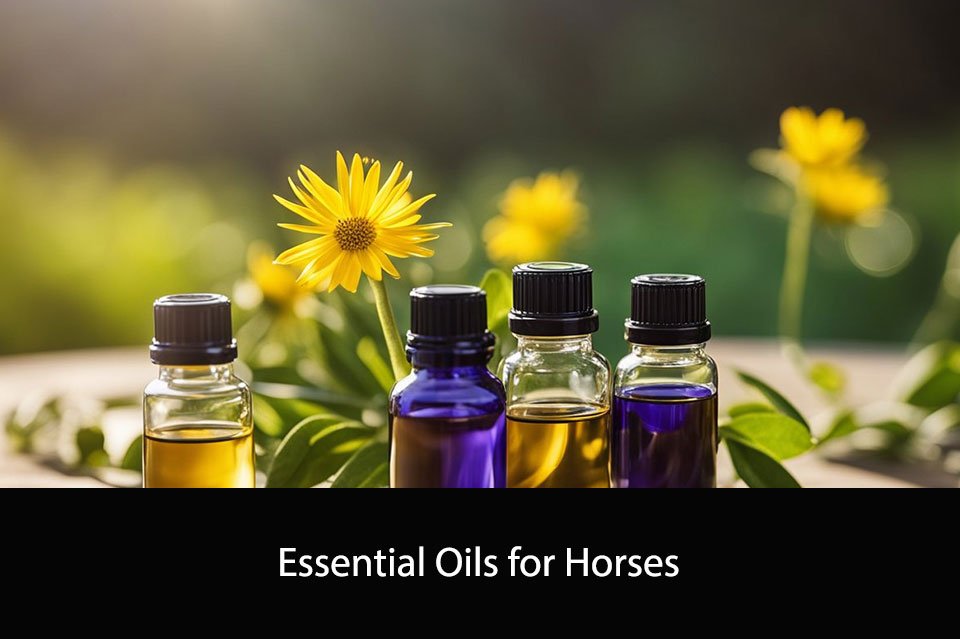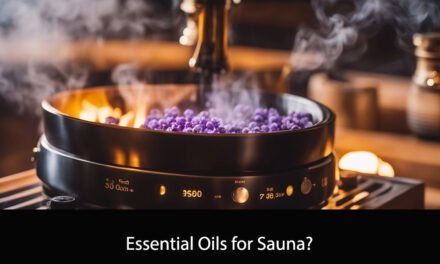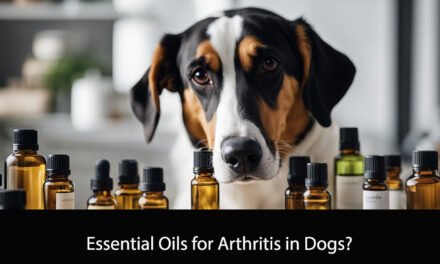Essential oils have been used for centuries to promote health and well-being in humans, and now they are gaining popularity in the equine world as well. Essential oils are concentrated plant extracts that can be used to support the physical and emotional health of horses. When used properly, essential oils can be a safe and effective way to support your horse’s health and wellness.
Essential oils can be used to help horses with a variety of issues, including respiratory problems, digestive issues, and skin conditions. Some essential oils can also help to promote relaxation and reduce stress in horses. However, it is important to note that essential oils should not be used as a substitute for veterinary care. If your horse is experiencing a health issue, it is important to consult with your veterinarian before using essential oils.
Understanding Essential Oils

Essential oils are highly concentrated plant extracts that are derived through distillation or cold-pressing methods. These oils contain the essence or aroma of the plant and are known for their therapeutic properties. Essential oils are widely used in aromatherapy, and they are becoming increasingly popular in the equine industry.
Essential oils can be used for a variety of purposes, including promoting relaxation, reducing stress, and supporting overall health and wellness. When used correctly, essential oils can be a safe and effective way to support your horse’s health.
It’s important to note that essential oils are highly concentrated and should be used with caution. Some oils can be toxic to horses, and others can cause skin irritation or other adverse reactions. Always dilute essential oils properly and consult with a veterinarian or equine aromatherapist before using essential oils on your horse.
When using essential oils on horses, it’s important to consider the horse’s individual needs and preferences. Some horses may be more sensitive to certain oils, while others may benefit from a specific oil or blend. Experiment with different oils and blends to find what works best for your horse.
Overall, essential oils can be a valuable tool for supporting your horse’s health and well-being. With proper use and caution, essential oils can be a safe and effective way to promote relaxation, reduce stress, and support overall health.
Benefits of Essential Oils for Horses

Essential oils have been used for centuries to promote health and wellness in both humans and animals. Horses are no exception, and the benefits of essential oils for horses are numerous. Here are some of the ways that essential oils can benefit your equine partner:
- Relaxation and Calming: Essential oils such as lavender, chamomile, and valerian root can help to calm nervous or anxious horses. These oils can be diffused in the barn or added to a carrier oil and applied topically to the horse’s chest or nose.
- Pain Relief: Essential oils such as peppermint and wintergreen can be used topically to help ease muscle soreness and joint pain in horses. These oils can be added to a carrier oil and massaged into the affected area.
- Respiratory Support: Essential oils such as eucalyptus and peppermint can help to support respiratory health in horses. These oils can be diffused in the barn or added to a carrier oil and applied topically to the horse’s chest.
- Insect Repellent: Essential oils such as citronella, lemongrass, and lavender can help to repel insects such as flies, mosquitoes, and ticks. These oils can be added to a carrier oil and applied topically to the horse’s coat.
- Improved Digestion: Essential oils such as ginger and fennel can help to support healthy digestion in horses. These oils can be added to the horse’s feed or water.
Overall, essential oils can be a valuable addition to your horse’s wellness routine. However, it’s important to remember that essential oils should never be used as a substitute for veterinary care. Always consult with your veterinarian before using essential oils on your horse.
Types of Essential Oils for Horses

When it comes to essential oils for horses, there are several types that can be used to promote health and well-being. Here are some of the most commonly used essential oils for horses:
Lavender
Lavender essential oil is well-known for its calming properties. It can be used to help horses relax and reduce anxiety. Lavender oil can also be used topically to promote wound healing and reduce inflammation.
Peppermint
Peppermint essential oil is often used to help horses with respiratory issues. It can help to open up the airways and reduce congestion. Peppermint oil can also be used topically to reduce muscle soreness and inflammation.
Chamomile
Chamomile essential oil is another calming oil that can be used to help horses relax. It can also be used topically to promote wound healing and reduce inflammation.
Eucalyptus
Eucalyptus essential oil is commonly used to help horses with respiratory issues. It can help to open up the airways and reduce congestion. Eucalyptus oil can also be used topically to reduce muscle soreness and inflammation.
Overall, essential oils can be a great addition to your horse’s health and wellness routine. However, it’s important to use them safely and appropriately. Always dilute essential oils before use and consult with a veterinarian before using them on your horse.
How to Use Essential Oils on Horses
When it comes to using essential oils on horses, there are two main methods: topical application and aromatherapy. Both methods can be effective, but it’s important to use caution and follow proper dilution guidelines to avoid any adverse reactions.
Topical Application
Topical application involves applying essential oils directly to the horse’s skin. This method can be effective for treating skin conditions, muscle soreness, and other localized issues. However, it’s important to dilute the essential oil properly before applying it to the skin.
To dilute essential oils for horses, we recommend using a carrier oil such as coconut oil, jojoba oil, or olive oil. A general guideline for dilution is 1-2 drops of essential oil per tablespoon of carrier oil. Always test the diluted oil on a small area of the horse’s skin before applying it more widely.
Aromatherapy
Aromatherapy involves diffusing essential oils into the air to create a calming and relaxing atmosphere for the horse. This method can be effective for reducing stress and anxiety, promoting relaxation, and improving overall well-being.
To use essential oils for aromatherapy, we recommend using a diffuser designed specifically for use with essential oils. Place the diffuser in the horse’s stall or in an enclosed area where the horse spends time. Add 3-5 drops of essential oil to the diffuser and let it run for 15-30 minutes at a time.
It’s important to note that not all essential oils are safe for use on horses. Some oils can be toxic or irritating, so it’s important to do your research and use caution when selecting oils to use on your horse. Always start with a small amount and monitor your horse for any signs of adverse reactions.
Overall, when used properly, essential oils can be a safe and effective way to promote wellness and treat various conditions in horses.
Safety Measures and Precautions
When using essential oils on horses, it is important to take certain precautions to ensure their safety and well-being. Here are some essential safety measures and precautions that we recommend:
- Always dilute essential oils before applying them to your horse’s skin or coat. Undiluted essential oils can be too strong and may cause skin irritation or other adverse reactions.
- Never apply essential oils directly to your horse’s eyes, nose, or mouth. If you need to apply an oil to these areas, dilute it first and use a gentle touch.
- Avoid using essential oils on pregnant mares or young foals, as their developing bodies may be more sensitive to certain oils.
- Always use high-quality, pure essential oils that have been properly stored and handled to ensure their potency and effectiveness.
- Start with small amounts of essential oils and gradually increase as needed, monitoring your horse’s reactions closely.
- Be aware of any potential interactions between essential oils and other medications or supplements your horse may be taking. If in doubt, consult with your veterinarian before using essential oils.
- Store essential oils in a cool, dry place out of reach of children and animals.
By following these safety measures and precautions, you can help ensure that your horse enjoys the many benefits of essential oils without any adverse effects.
Potential Risks and Side Effects
When using essential oils on horses, it’s important to be aware of potential risks and side effects. While essential oils can provide many benefits, improper use can lead to adverse reactions.
First, it’s important to note that not all essential oils are safe for horses. Some oils can be toxic and should be avoided altogether. For example, tea tree oil can be toxic to horses and should not be used topically or ingested.
In addition, essential oils should always be diluted before use on horses. Undiluted oils can cause skin irritation, burns, or other adverse reactions. We recommend diluting essential oils to a maximum concentration of 1-2% before use.
It’s also important to monitor your horse for any signs of adverse reactions after using essential oils. Some horses may be more sensitive to certain oils than others, and may experience skin irritation, respiratory issues, or other adverse reactions.
If you notice any signs of an adverse reaction, such as skin redness or swelling, difficulty breathing, or other symptoms, discontinue use of the essential oil immediately and seek veterinary care if necessary.
Overall, while essential oils can provide many benefits for horses, it’s important to use them safely and responsibly to avoid potential risks and side effects.
Consulting a Veterinarian
When it comes to using essential oils for horses, it’s important to consult a veterinarian before starting any treatment. A veterinarian can help determine if essential oils are appropriate for your horse’s condition and can provide guidance on the proper use and dosage.
While essential oils can offer many benefits for horses, they can also be harmful if used improperly. Some essential oils can be toxic if ingested or absorbed through the skin, and others can cause skin irritation or allergic reactions. A veterinarian can help identify any potential risks and can recommend safe and effective essential oils for your horse.
It’s also important to note that essential oils should never be used as a substitute for proper veterinary care. If your horse is experiencing a medical emergency or has a serious health condition, it’s important to seek professional veterinary care immediately.
In summary, consulting a veterinarian is essential when considering the use of essential oils for horses. A veterinarian can provide valuable guidance on the safe and effective use of essential oils and can help ensure the health and well-being of your horse.
Frequently Asked Questions

Are essential oils toxic to horses?
It depends on the type and amount of essential oil used. Some essential oils can be toxic to horses if ingested or used in high concentrations. It is important to properly research and dilute essential oils before using them on horses.
What are the benefits of using Young Living essential oils for horses?
Young Living essential oils are known for their purity and quality, which can provide numerous benefits for horses. These benefits can include supporting respiratory health, promoting relaxation and calmness, and supporting healthy skin and coat.
Can lavender oil be used to calm horses?
Yes, lavender oil is known for its calming properties and can be used to help calm horses. It is important to properly dilute the oil and use it in moderation.
How can essential oils be used in horse fly spray?
Essential oils can be added to a horse fly spray to help repel flies and other insects. Some essential oils that can be effective in fly spray include citronella, eucalyptus, and peppermint.
What are the benefits of using frankincense for horses?
Frankincense oil is known for its anti-inflammatory properties and can be beneficial for horses with joint or muscle issues. It can also support respiratory health and promote relaxation.
How can tea tree oil be safely diluted for use on horses?
Tea tree oil should be properly diluted before use on horses to avoid skin irritation or other adverse reactions. A recommended dilution ratio is 1-2 drops of tea tree oil per ounce of carrier oil, such as coconut or olive oil.





